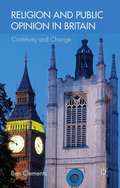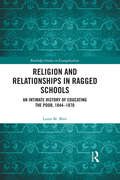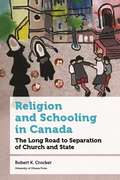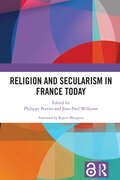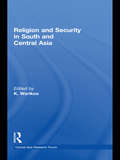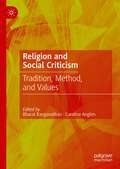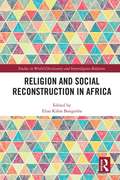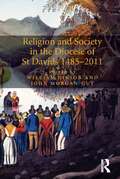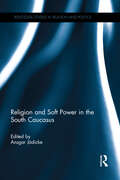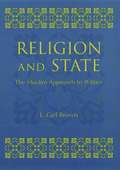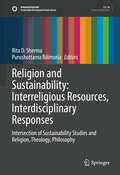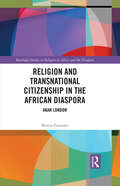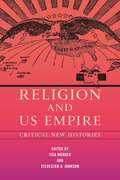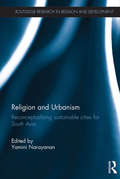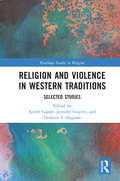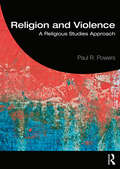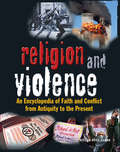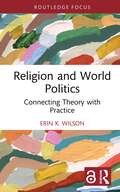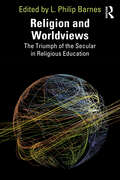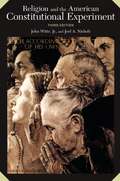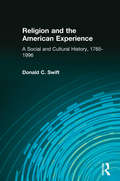- Table View
- List View
Religion and Public Opinion in Britain
by Ben ClementsBased on extensive analysis of surveys from recent decades, this book provides a detailed study of the attitudes of religious groups in Britain. It looks at continuity and change in relation to party support, ideology, abortion, homosexuality and gay rights, foreign policy, and public opinion towards religion in public life.
Religion and Public Policy: Human Rights, Conflict, and Ethics
by Sumner B. Twiss Marian Gh. Simion Rodney L. PetersenThis book pivots around two principal concerns in the modern world: the nature and practice of human rights in relation to religion, and the role of religion in perennial issues of war and peace. Taken collectively, the chapters articulate a vision for achieving a liberal peace and a just society firmly grounded in respect for human rights, while working in tandem with the constructive roles that religious ideas, leaders, and institutions can play even amid cultural difference. Topics covered include: the status and justification of human rights; the meaning and significance of religious liberty; whether human rights protections ought to be extended to other species; how the comparative study of religious ethics ought to proceed; the nature, limits, and future development of just war thinking; the role of religion and human rights in conflict resolution, diplomacy, and peace-building; and the tensions raised by religious involvement in public policy and state institutional practices. Featuring a group of distinguished contributors, this is a multifaceted and original exploration of the aforementioned themes.
Religion and Relationships in Ragged Schools: An Intimate History of Educating the Poor, 1844-1870 (Routledge Studies in Evangelicalism)
by Laura M. MairFocusing on the interaction between teachers and scholars, this book provides an intimate account of "ragged schools" that challenges existing scholarship on evangelical child-saving movements and Victorian philanthropy. With Lord Shaftesbury as their figurehead, these institutions provided a free education to impoverished children. The primary purpose of the schools, however, was the salvation of children’s souls. Using promotional literature and local school documents, this book contrasts the public portrayal of children and teachers with that found in practice. It draws upon evidence from schools in Scotland and England, giving insight into the achievements and challenges of individual institutions. An intimate account is constructed using the journals maintained by Martin Ware, the superintendent of a North London school, alongside a cache of letters that children sent him. This combination of personal and national perspectives adds nuance to the narratives often imposed upon historic philanthropic movements. Investigating how children responded to the evangelistic messages and educational opportunities ragged schools offered, this book will be of keen interest to historians of education, emigration, religion, as well as of the nineteenth century more broadly.
Religion and Schooling in Canada: The Long Road to Separation of Church and State (Education)
by Robert K. CrockerLes organisations chrétiennes ont toujours été impliquées dans l’éducation canadienne. En 1949, cinq provinces comptaient des écoles confessionnelles protégées par la Constitution. Le gouvernement fédéral a essentiellement confié sa responsabilité de l’éducation pour les peuples autochtones aux églises pour plus d’un siècle. Résultat : une histoire de mauvais traitements seulement mise au jour récemment.Des années 1950 aux années 1970, plusieurs mesures dans diverses provinces ont posé les jalons pour d’importantes réformes en éducation. Certaines testaient les limites des protections confessionnelles, mais ne pouvaient éliminer les structures constitutionnelles sous-jacentes.Le rapatriement de la Constitution et l’adoption de la Charte des droits et libertés en 1982 ont codifié des changements fondamentaux dans la perception des droits civils. La Charte permettait des remises en question des droits confessionnaux sur plusieurs fronts, mais elles ont toutes été refusées par les tribunaux au motif que la Charte ne peut servir à déroger à d’autres parties de la Constitution.Dans les années 1990, le mode de révision se présente comme une autre voie vers la réforme. On a recouru à des modifications constitutionnelles pour mettre fin au contrôle confessionnel des écoles à Terre-Neuve et au Québec en 1997 et en 1998.Les circonstances entourant ces modifications constitutionnelles sont scrutées comme précédents possibles pour obtenir des résultats semblables en Alberta, en Ontario et en Saskatchewan. Cet ouvrage soutient que des changements y sont inévitables et présente plusieurs voies vers la réforme. Cette réforme vise à éliminer la discrimination inhérente dans les établissements confessionnels tout en préservant une participation religieuse dans certaines écoles.
Religion and Secularism in France Today
by Jean-Paul Willaime Philippe PortierThis volume explores the dynamic life of religion and politics in France. The separation of church and state and the autonomy of school education from religion are the two fundamental pillars of France as a secular republic. The historical construction of French secularism (laïcité) was particularly marked by the strong opposition between the state and the Catholic church. However, the religious disaffiliation of a significant proportion of the French strengthened state secularism, which gradually became more consensual – despite some persisting tensions in the school context. Yet, in the last decades, several factors have revived public debate on laicity: the quarrel over ‘sects’ and new religious movements; controversies over Islam, today the second-largest religion in France; and, more recently, dispute over bioethics. Faced with these challenges, laicity as well as the religious groups involved have been changing. The authors of this book, ranking amongst the best French experts in the study of religion and secularism, introduce the reader to a living and lived laicity influenced by the social and religious dynamics of contemporary France. They demonstrate that the configurations of French secularism are both more flexible and complex than they appear to be. The volume investigates the extent to which the French idea of secularization has been pushed to be more thorough and radical in its interaction with its other European counterparts. A key work on French political thought, this volume will be of great interest to scholars and researchers of international politics, political philosophy, political sociology, and religion and politics.
Religion and Security in South and Central Asia (Central Asia Research Forum)
by K. WarikooReligion and security play an important role in traditional societies. In South and Central Asia, traditional and moderate Islamic beliefs and practices with strong indigenous and Sufi content are diametrically opposed to radical Wahabi and Taliban brands of Islam intolerant of other cultures and groups. The emergence of radical extremist and violent Islamist movements poses serious challenges to the secular and democratic polity, inter-religious harmony, security and territorial integrity of states in the region. As such, religious extremism, terrorism, drug trafficking and arms smuggling are viewed by various countries in South and Central Asia and also in the West as the main threats to their security. Against this backdrop, this book provides local perspectives on religion, security, history and geopolitics in South Asia and Central Asia in an integrated manner. Presenting a holistic and updated view of the developments inside and across South and Central Asia, it offers concise analyses by experts on the region. Contributors discuss topics such as the resurgence of the Taliban in Afghanistan, the politics and practice of Islamist terrorism in India, and the security challenges posed by religious radicalism in Bangladesh. The book makes a significant contribution to South and Central Asian Studies, as well as studies on Regional Security.
Religion and Social Criticism: Tradition, Method, and Values
by Bharat Ranganathan Caroline AnglimThis volume brings together emerging and established religious ethicists to investigate how those in the field carry forward the practice and tradition of social criticism and, at the same time, how social criticism informs the scholarly values of their field. Contributors reflect on the nature of the moral subject and the ethical weight of human dignity and consider the limits and possibilities of religious humanism in orienting the work of social criticism. They compare religious sources and forms of research in religious ethics to secular sources and the tradition of liberal social criticism. And they offer proposals for how religious ethics can help humanists navigate our complex and multicultural moral landscape and what this field reveals about the ultimate ends of humanistic scholarship.
Religion and Social Reconstruction in Africa (Studies in World Christianity and Interreligious Relations)
by Elias Kifon BongmbaReligion has played a major role in both the division and unification of peoples and countries within Africa. Its capacity to cause, and to heal, societal rifts has been well documented. This book addresses this powerful societal force, and explores the implications of a theology of reconstruction, most notably articulated by Jesse Mugambi. This way of thinking seeks to build on liberation theology, aiming to encourage the rebuilding of African society on its own terms. An international panel of contributors bring an interdisciplinary perspective to the issues around reconstructing the religious elements of African society. Looking at issues of reconciliation, postcolonialism and indigenous spirituality, among others, they show that Mugambi’s cultural and theological insight has the potential to revolutionise the way people in Africa address this issue. This is a fascinating exploration of the religious facets of African life. As such, it will be of great interest to scholars of religious studies, theology and African studies.
Religion and Society in the Diocese of St Davids 1485-2011
by John Morgan-GuyDuring the medieval and early modern periods the Welsh diocese of St Davids was one of the largest in the country and the most remote. As this collection makes clear, this combination of factors resulted in a religious life which was less regulated and controlled by the institutional forces of both Church and State. Addressing key ideas in the development of popular religious culture and the stubborn continuity of long-lasting religious practices into the modern era, the volume shows how the diocese was also a locus for continuing major religious controversies, especially in the nineteenth century. Presenting a fresh view of the Diocese of St Davids since the Reformation, this is the first new account of religion and society in over a century. It is, moreover, not one which is written primarily from an institutional perspective but from that of wider society. As well as a chronological treatment, giving an overview of the history of religion in the diocese, chapters address key themes, including a study of religious revivals which originated within the borders of the diocese; consideration of popular and elite education, including the contribution of Bishop Burgess's pioneering institution at Lampeter (the first degree awarding institution in England and Wales after Oxford and Cambridge); the relationship of the Church to the revival of Welsh cultural identity; and new reflections on the agitation and realisation of disestablishment of the Church as it affected Wales. As such, this pioneering study has much to offer all those with an interest, not only in Welsh history, but ecclesiastical history more broadly.
Religion and Soft Power in the South Caucasus (Routledge Studies in Religion and Politics)
by Ansgar JödickeIn the Caucasus region, Georgia, Armenia, Azerbaijan and their powerful neighbours Russia, Turkey, Iran and the EU negotiate their future policies and spheres of influence. This volume explores the role of religion in the South Caucasus to describe and explain how transnational religious relationships intermingle with transnational political relationships. The concept of ‘soft power’ is the heuristic starting point of this important investigation to define the importance of religion in the region. Drawing on a three-year project supported by the Swiss National Science Foundation, the book brings together academics from the South Caucasus and across Europe to offer original empirical research and contributions from experienced researchers in political science, history and oriental studies. This book will be of interest to scholars in the fields of post-Soviet studies, international relations, religious studies and political science.
Religion and State in Syria
by Thomas PierretWhile Syria has been dominated since the 1960s by a determinedly secular regime, the 2011 uprising has raised many questions about the role of Islam in the country's politics. This book demonstrates that with the eradication of the Muslim Brothers after the failed insurrection of 1982, Sunni men of religion became the only voice of the Islamic trend in the country. Through educational programs, charitable foundations and their deft handling of tribal and merchant networks, they took advantage of popular disaffection with secular ideologies to increase their influence over society. In recent years, with the Islamic resurgence, the Alawi-dominated Ba'thist regime was compelled to bring the clergy into the political fold. This relationship was exposed in 2011 by the division of the Sunni clergy between regime supporters, bystanders and opponents. This book affords a new perspective on Syrian society as it stands at the crossroads of political and social fragmentation.
Religion and State: The Muslim Approach to Politics
by L. BrownIf Westerners know a single Islamic term, it is likely to be jihad, the Arabic word for "holy war." The image of Islam as an inherently aggressive and xenophobic religion has long prevailed in the West and can at times appear to be substantiated by current events. L. Carl Brown challenges this conventional wisdom with a fascinating historical overview of the relationship between religious and political life in the Muslim world ranging from Islam's early centuries to the present day. Religion and State examines the commonplace notion—held by both radical Muslim ideologues and various Western observers alike—that in Islam there is no separation between religion and politics. By placing this assertion in a broad historical context, the book reveals both the continuities between premodern and modern Islamic political thought as well as the distinctive dimensions of modern Muslim experiences. Brown shows that both the modern-day fundamentalists and their critics have it wrong when they posit an eternally militant, unchanging Islam outside of history. "They are conflating theology and history. They are confusing the oughtand the is," he writes. As the historical record shows, mainstream Muslim political thought in premodern times tended toward political quietism.Brown maintains that we can better understand present-day politics among Muslims by accepting the reality of their historical diversity while at the same time seeking to identify what may be distinctive in Muslim thought and action. In order to illuminate the distinguishing characteristics of Islam in relation to politics, Brown compares this religion with its two Semitic sisters, Judaism and Christianity, drawing striking comparisons between Islam today and Christianity during the Reformation. With a wealth of evidence, he recreates a tradition of Islamic diversity every bit as rich as that of Judaism and Christianity.
Religion and Sustainability: Intersection of Sustainability Studies and Religion, Theology, Philosophy (Sustainable Development Goals Series)
by Purushottama Bilimoria Rita D. ShermaThis volume brings sustainability studies into creative and constructive conversation with actions, practices, and worldviews from religion and theology supportive of the vision and work of the UN SDGs. It features more than 30 chapters from scholars across diverse disciplines, including economics, ethics, theology, sociology, ritual studies, and visual culture. This interdisciplinary content presents new insights for inhibiting ecospheric devastation, which is inextricably linked to unsustainable financial, societal, racial, geopolitical, and cultural relationships. The chapters show how humanistic elements can enable the establishment of sustainable ways of thinking, feeling, and acting. This includes the aesthetic and emotive dimensions of life. The contributors cover such topics as empowering women and girls to systemically reverse climate change; nurturing interreligious peace; decolonizing landscapes; and promoting horticulture, ecovillages, equity, and animal ethics. Coverage integrates a variety of religious and theological perspectives. These include Buddhism, Judaism, Hinduism, Islam, Christianity, and other traditions.To enable the restoration and flourishing of the ecosystems of the biosphere, human societies need to be reimagined and reordered in terms of economic, cultural, religious, racial, and social equitability. This volume illustrates transformative paradigms to help foster such change. It introduces new principles, practices, ethics, and insights to the discourse. This work will appeal to students, scholars, and professionals researching the ethical, moral, social, cultural, psychological, developmental, and other social scientific impacts of religion on the key markers of sustainability.
Religion and Transnational Citizenship in the African Diaspora: Akan London (Routledge Studies on Religion in Africa and the Diaspora)
by Mattia FumantiThis book focuses on Akan-speaking Ghanaians in London and explores in detail the experience of African migrants living in Britain, investigating how they construct their British citizenship through their membership of the church. Building on extensive ethnographic research in London and Ghana, the author explores the relationship between religion and citizenship, the emergence of transnational subjectivities, and the making of diaspora aesthetics among African migrants. Starting from the understanding that citizenship is dialogical, a status mediated by a subject’s multiple and intersecting identities, the author highlights the limitations of existing conceptualisations of migrant citizenship. Anchored in a case study of the British/Ghanaian Methodist Church as a transnational religious organisation and cultural polity, the book explores diasporic religious subjectivities as both cosmopolitan and transnational, while being configured in emotionally and morally significant ways by the Methodist Church, as well as family, ethnicity, and nation. Interdisciplinary by nature, this book will be of interest to a wide range of researchers and scholars across the social sciences and humanities working in the fields of anthropology, religion, sociology, postcolonial studies, and African studies, and additionally policy makers interested in diaspora and migration studies.
Religion and US Empire: Critical New Histories (North American Religions)
by Tisa Wenger and Sylvester A. JohnsonShows how American forms of religion and empire developed in tandem, shaping and reshaping each other over the course of American historyThe United States has been an empire since the time of its founding, and this empire is inextricably intertwined with American religion. Religion and US Empire examines the relationship between these dynamic forces throughout the country’s history and into the present. The volume will serve as the most comprehensive and definitive text on the relationship between US empire and American religion.Whereas other works describe religion as a force that aided or motivated American imperialism, this comprehensive new history reveals how imperialism shaped American religion—and how religion historically structured, enabled, challenged, and resisted US imperialism. Chapters move chronologically from the eighteenth century to the twenty-first, ranging geographically from the Caribbean, Michigan, and Liberia, to Oklahoma, Hawai’i, and the Philippines. Rather than situating these histories safely in the past, the final chapters ask readers to consider present day entanglements between capitalism, imperialism, and American religion. Religion and US Empire is an urgent work of history, offering the context behind a relationship that is, for better or worse, very much alive today.
Religion and Urbanism: Reconceptualising sustainable cities for South Asia (Routledge Research in Religion and Development)
by Yamini NarayananConceptions of 'sustainable cities' in the pluralistic and multireligious urban settlements of developing nations need to develop out of local cultural, religious and historical contexts to be inclusive and accurately respond to the needs of the poor, ethnic and religious minorities, and women. Religion and Urbanism contributes to an expanded understanding of 'sustainable cities' in South Asia by demonstrating the multiple, and often conflicting ways in which religion enables or challenges socially equitable and ecologically sustainable urbanisation in the region. In particular, this collection focuses on two aspects that must inform the sustainable cities discourse in South Asia: the intersections of religion and urban heritage, and religion and various aspects of informality. This book makes a much-needed contribution to the nexus between religion and urban planning for researchers, postgraduate students and policy makers in Sustainable Development, Development Studies, Urban Studies, Religious Studies, Asian Studies, Heritage Studies and Urban and Religious Geography.
Religion and Violence in Western Traditions: Selected Studies (Routledge Studies in Religion)
by André GagnéThis book examines the connection between religion and violence in the Western traditions of the three Abrahamic faiths, from ancient to modern times. It addresses a gap in the scholarly debate on the nature of religious violence by bringing scholars that specialize in pre-modern religions and scriptural traditions into the same sphere of discussion as those specializing in contemporary manifestations of religious violence. Moving beyond the question of the “authenticity” of religious violence, this book brings together scholars from a variety of disciplines. Contributors explore the central role that religious texts have played in encouraging, as well as confronting, violence. The interdisciplinary conversation that takes place challenges assumptions that religious violence is a modern problem that can be fully understood without reference to religious scriptures, beliefs, or history. Each chapter focuses its analysis on a particular case study from a distinct historical period. Taken as a whole, these chapters attest to the persistent relationship between religion and violence that links the ancient and contemporary worlds. This is a dynamic collection of explorations into how religion and violence intersect. As such, it will be a key resource for any scholar of Religious Studies, Theology and Religion and Violence, as well as Christian, Jewish, and Islamic Studies.
Religion and Violence: A Religious Studies Approach
by Paul R. PowersDoes religion cause much of the world’s violence? Is religion inherently violent? Would violence disappear if religion did? Is true religion a force for peace? Is religion a mask for power and self-interest? What aspects of religion make violence more—or less—likely? Religion and Violence: A Religious Studies Approach explores the potential of classic social theories to shed light on the relationships between religion and violence. This accessible and engaging book starts from the premise that both religion and violence are ordinary elements of social life and that rather than causing violence religion plays a crucial role in the management of violence. Ideal for any student approaching the topic of religion and violence for the first time, this core textbook includes chapter overviews and summaries, guides for applying theory to real-world events, discussion questions, and case studies. Further teaching and learning resources are available on the accompanying companion website.
Religion and Violence: An Encyclopedia of Faith and Conflict from Antiquity to the Present
by Jeffrey Ian RossFirst Published in 2015. Daily newspaper headlines, talk radio and cable television broadcasts, and Internet news web sites continuously highlight the relationship between religion and violence. These media contain stories about such diverse incidents as suicide attacks by Islamic fundamentalists in Afghanistan, Iraq, Israel, Pakistan, and elsewhere, and assassinations of doctors who perform abortions by white American Christian true believers in the United States. How does one make sense of the role of religion in violence, and of perpetrators of violence who cite religion as a motivation? This encyclopedia includes a wide range of entries: biographies of key figures, historical events, religious groups, countries and regions where religion and violence have intersected, and practices, rituals, and processes of religious violence.
Religion and World Politics: Connecting Theory with Practice
by Erin K. WilsonReligion and World Politics provides a short, accessible, and practical introduction to how we can understand the place of religion in world politics in a more comprehensive, contextually relevant way. Is religion central or irrelevant, positive or negative in world politics today? So much political commentary and analysis focuses on these issues. But these are the wrong questions to be asking. Designed for practitioners, policymakers, and newcomers to the topic of religion and global politics, this book emphasises that religion is not something clear, identifiable, and definable, but is fluid and shifting. Consequently, we need analytical frameworks that help us to make sense of this ever-changing phenomenon. The author presents a critical, intersectional framework for analysing religion and applies this to case studies of three core areas of international relations (IR) analysis: (1) conflict, violence, and security; (2) development and humanitarianism; and (3) human rights, law, and public life. These cases highlight how assumptions about what religion is and does affect policymakers, theorists, and activists. The book demonstrates the damage that has been done through policies and programmes based on unquestioned assumptions and the possibilities and insights to be gained by incorporating the critical study of religion into research, policymaking, and practice. This book will be of great interest to students of global politics, IR, religion, and security studies, as well as diplomats, civil servants, policymakers, journalists, and civil society practitioners. It will also benefit IR scholars interested in developing their research to include religion, as well as scholars of religion from disciplines outside IR interested in a deeper understanding of religion and world politics. The Open Access version of this book, available at www.taylorfrancis.com, has been made available under a Creative Commons Attribution-Non Commercial-No Derivatives 4.0 license. Thanks to the support of libraries working with Knowledge Unlatched www.knowledgeunlatched.org
Religion and Worldviews: The Triumph of the Secular in Religious Education
by L. Philip BarnesReligion and Worldviews: The Triumph of the Secular in Religious Education provides the first serious analysis and review of the Commission on Religious Education’s proposed worldviews framework for the subject. It argues that religious education has an important contribution to make to the aims of liberal education and examines whether the shift to a worldview framework is capable of overcoming current weaknesses and initiating a new positive direction for the future. Chapters explore the role of worldviews in Religious Education, covering key debates including: Whether there is need for new legislation on RE The nature of professionalism and the role of ‘experts’ The extent to which there is educational value in study of the personal worldviews of students The role of the religious voice in RE The relation of religions to religious worldviews The aims of RE The relationship between the state and religion Consideration of the nature of a worldview The personal reflections of a member of the Commission on its proposals. The chapters provide all that is necessary to understand and to evaluate the current debate on the appropriateness of a worldviews approach to RE. Bringing together leading names in the field, this is essential reading for trainee and practising teachers of Religious Education, RE advisers and schools’ leaders responsible for curriculum development.
Religion and the American Constitutional Experiment
by John Witte Jr. Joel A. NicholsThis updated edition of Religion and the American Constitutional Experiment provides a comprehensive, multidisciplinary overview of the history, theory, law, and comparative analysis of American religious liberty from the earliest colonial period through the most recent Supreme Court cases. In accessible, jargon-free language, the authors present balanced discussions of controversial issues, including the funding of religious schools and charities and displaying religious symbols on government property. Three chapters new to this edition cover the free exercise of religion, religion and public life, and religious organizations and the law. In addition, the authors address seven new cases, and an expanded concluding chapter places the American experience in a global context by comparing contemporary American religious liberty law with international human rights standards.
Religion and the American Constitutional Experiment
by John Witte Jr. Joel A. NicholsThe third edition of this classic book provides a comprehensive, multidisciplinary overview of the history, theory, law, and comparative analysis of American religious liberty from the earliest colonial period through the most recent Supreme Court cases. The authors present balanced, accessible discussions of controversial issues, such as funding religious schools and charities and displaying religious symbols on government property. Three chapters new to this edition cover the free exercise of religion, religion and public life, and religious organizations and the law. In addition, an expanded concluding chapter places the American experience in global context by comparing contemporary American religious liberty law with international human rights standards.
Religion and the American Constitutional Experiment (3rd Edition)
by John Witte Jr. Joel A. NicholsThis volume offers a novel reading of the American constitutional experiment in religious liberty. The First Amendment, John Witte argues, is a synthesis of both the theological convictions and the political calculations of the eighteenth-century American founders. The founders incorporated six interdependent principles into the First Amendment-liberty of conscience, freedom of exercise, equality of faiths, plurality of confessions, disestablishment of religion, and separation of church and state. Both the nuance and the balance of these six principles have often been lost on current interpreters of the First Amendment. Particularly the Supreme Court has tended to reduce the First Amendment to mechanical tests and metaphorical formulae that often replace, rather than guide, its analysis and application of these principles. First Amendment doctrine today has thus become notoriously confused, casuistic, and self-contradictory. Religion and the American Constitutional Experiment urges a return to the principled approach to religious rights, evident both in the American founding era and in the modern international human rights movement. Witte uses these principles to analyze the free exercise and establishment case law of the last two centuries. He then illustrates the virtues of his principled approach through analysis of the thorny contests over tax exemptions for religions, the role of religion in the public school, among others. This lucid and engaging volume serves both as a provocative primer for students and a pristine restatement for specialists in law, religion, history, politics, and American studies. Through a fresh reading of the sources and cases, and through the discovery and introduction of several new materials, the author reclaims the essential value, vigor, and vitality of our most cherished religious rights and liberties.
Religion and the American Experience: A Social and Cultural History, 1765-1996
by Donald C. SwiftReligion in the USA manifests itself in many forms and this book examines them, from religion in the early republic, to early African American religion, reform, nativism movements, and fundamentalism, up to the contemporary culture wars, in a study that spans almost 250 years.
